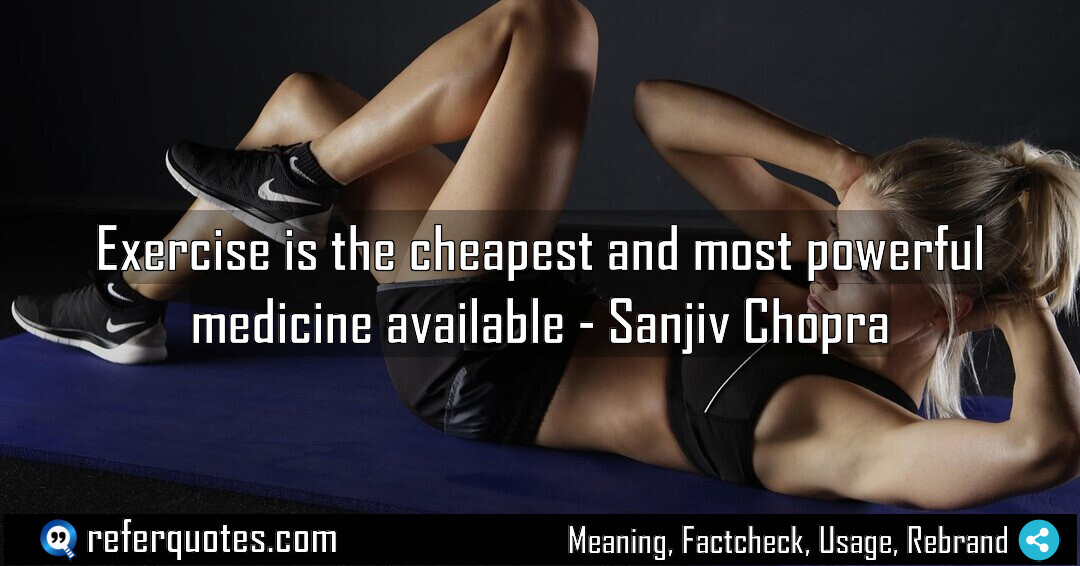Find audience, meaning, origin, and book of quote- Exercise is the cheapest and most powerful medicine available.
It’s a truth we see in the data every single day. Forget expensive prescriptions for a moment; the most transformative treatment is often movement.
Share Image Quote:Table of Contents
Meaning
It means that consistent physical activity provides a staggering array of health benefits that rival, and often surpass, what modern pharmacology can offer, and it does so at a negligible cost.
Explanation
I’ve been digging into health analytics for over a decade, and this is one of the few non-negotiables. When we say medicine, we’re not being cute. We’re talking about a proven, potent intervention that directly impacts everything from blood pressure and insulin sensitivity to neurotransmitters and inflammatory markers. It’s a systemic reset. The cheapest part is just the brutal, beautiful truth. You don’t need a fancy gym membership. A pair of shoes and the will to walk is a complete turning point for so many of the chronic conditions we struggle with today. It’s the ultimate high-ROI health investment.
Summary
| Category | Health (55) |
|---|---|
| Topics | exercise (1), longevity (10), prevention (4) |
| Style | persuasive (5), simple (16) |
| Mood | energetic (3), motivating (14) |
Origin & Factcheck
| Author | Sanjiv Chopra (8) |
|---|---|
| Book | Doctor Chopra Says: Medical Facts and Myths Everyone Should Know (8) |
About the Author
Dr. Sanjiv Chopra professor of medicine at Harvard Medical School. He writes and speaks on wellness, purpose, longevity, and leadership.
| Official Website | Facebook | X| Instagram
Quotation Source:
| Exercise is the cheapest and most powerful medicine available |
| Publication Year: 2010; ISBN: 978-0312611742; Last Edition: 1st Edition; Number of Pages: 304. |
| Chapter 4: Movement and Life, Approximate page from 2010 edition |
Context
In the book, this isn’t just a throwaway line. It’s a foundational principle they use to debunk medical myths and empower readers. They place exercise right up there with the most critical life choices you can make for your long-term health, framing it as a first-line defense, not an optional extra.
Usage Examples
For instance, when a client is feeling overwhelmed by health advice, I’ll say, Look, before you stress about superfoods or expensive supplements, just master this one thing. Exercise is your baseline medicine. It’s incredibly effective for:
- Corporate Teams: To frame wellness programs not as a perk, but as a core strategy for reducing burnout and healthcare costs.
- Individuals Feeling Stuck: To give them a sense of agency and control over their own well-being.
- Healthcare Professionals: As a reminder to consistently integrate this message into patient conversations.
To whom it appeals?
| Audience | fitness trainers (6), health coaches (6), patients (21), professionals (93), students (282) |
|---|---|
This quote can be used in following contexts: fitness programs,health awareness talks,corporate wellness sessions,social media campaigns,school health education
FAQ
Question: But what if I have a physical limitation or chronic pain?
Answer: Exercise here doesn’t mean running a marathon. It means movement. For someone with limitations, that could be chair-based exercises, aquatic therapy, or gentle stretching. The key is consistent, appropriate movement, which often helps manage the pain itself.
Question: Is it really more powerful than actual medication?
Answer: yes. For managing conditions like pre-diabetes, mild to moderate depression, and high blood pressure, it’s often as effective as a first-line pharmaceutical. It’s not about replacing necessary meds, but about using this powerful tool to potentially reduce your need for them.
Question: How much exercise are we actually talking about?
Answer: The beautiful part is, you don’t need to become an athlete. The biggest ROI comes from simply going from a sedentary lifestyle to a moderately active one. 150 minutes of brisk walking per week can trigger most of these medicinal benefits. It’s about consistency over intensity.

